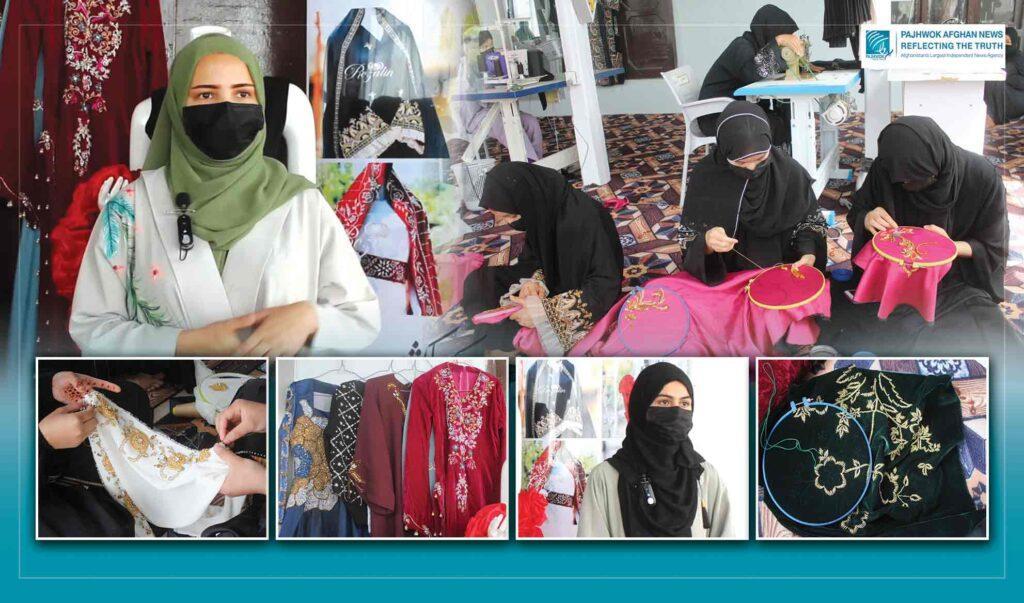
How Farzana Murad Turns Challenges Into Success?
She believes that with effort, patience and innovation one can transform challenges into opportunities.
After graduating from high school, Farzana had hoped to pursue higher education in her desired field at university.
However, the closure of institutions of higher education for girls dashed her dream. Despite this setback, she chose a new path. Having learned tailoring and handicrafts alongside her mother from a young age, she decided to make use of her skills.
Nearly two years ago, with only 10,000 afghanis, Farzana launched a tailoring and handicrafts workshop in Samangan.
Today, she not only supports herself, but also provides work and training for a number of other girls who, like her, have been deprived of education.
Her workshop has given hope and skills to girls who dream of learning, and it has become a source of income for her and a beacon of light for at least 20 other girls.
In the workshop, they sew hijabs, do embroidery, design traditional clothing and learn other handcraft skills.
Girls, who once felt hopeless due to unemployment and closure of schools, now work and learn in this workshop with renewed motivation.
Speaking to Pajhwok Afghan News, Farzana said:“Starting this workshop wasn't easy. I faced many challenges, including financial constraints, cultural opposition and social pressures. But I had full faith in my abilities and persevered with making this workshop a success through these barriers.”
She added:“I began with an initial capital of around 10,000 afghanis, which only covered basic essentials for the workshop. Over time, my capital increased, and now, along with supporting my family, the workshop's assets are worth close to 200,000 afghanis.”
Today, Farzana is not only an entrepreneur but also a teacher to other girls. In addition to tailoring, she teaches her students calligraphy and painting.
According to Farzana, no obstacle should stand in the way of a girl's or woman's future:“A talented and determined girl will undoubtedly face many challenges when trying to work, but these challenges should not deter her. She should be patient, make efforts, and seek alternative paths to success-because nothing is impossible.”
Farzana is no longer just a tailor or a trainer--- she is a symbol of hope more than 20 girls, who after the closure of schools and universities, were confined to their homes.
These girls now sit beside her at sewing machines, stitching a new future with each thread.
In this period, Farzana has also provided practical training in tailoring and embroidery to nearly 30 other girls. Many of them now work from home and have taken small but meaningful steps toward financial independence.
Yet, Farzana is not content with only this. She says:“My only wish is for the doors of education to reopen for girls. We all await the day we can return to school and university to pursue our unfinished dreams.”
Khadija Samea, one of the instructors at the workshop, describes the space as a haven for women in Samangan to express their art and culture-from painting and embroidery to sewing Afghan and Arabic traditional dresses.
However, she expresses concern about the lack of a dedicated market for women's products in Samangan:“Unfortunately, there is no independent market for women here to sell their products, so we are compelled to use websites and social media to grow our businesses.”
Khadija hopes that the government will support new female entrepreneurs-not only to help their businesses thrive, but also to reduce economic hardship and domestic violence. She believes that empowering women economically is the key to creating positive change in society.
Among those whose lives have been transformed are Hajara Jawadi and Ruwayda Hashemi-two girls who have gained not only artistic skills at the workshop but also confidence, hope, and purpose.
Hajara said:“Farzana didn't just give us jobs, she gave us belief and motivation. One day, we hope to help other girls just like she helped us.”
Ruwayda, who says she suffered emotionally after the closure of schools beyond grade 6, described the workshop as a source of healing and opportunity:“I learned new skills here, found peace, and now I work with passion.”
Alongside individual efforts, local institutions in Samangan also claim they support such initiatives.
Qari Enayatullah Yasini, Director General of Enterprises and Consumer Protection at the Samangan Department of Industry and Commerce, told Pajhwok Afghan News that his office has undertaken many activities in recent years-especially for female artisans and entrepreneurs.
He noted:“More than 2,000 women are currently active in various sectors across this province, and we support them. These women are mainly engaged in hand embroidery, cotton weaving, carpet weaving, and scarf making.”
He added that efforts were underway to connect female entrepreneurs and artisans with partner organisations that work with his department to help resolve the challenges they face.
kk/ma

Legal Disclaimer:
MENAFN provides the
information “as is” without warranty of any kind. We do not accept
any responsibility or liability for the accuracy, content, images,
videos, licenses, completeness, legality, or reliability of the information
contained in this article. If you have any complaints or copyright
issues related to this article, kindly contact the provider above.


















Comments
No comment